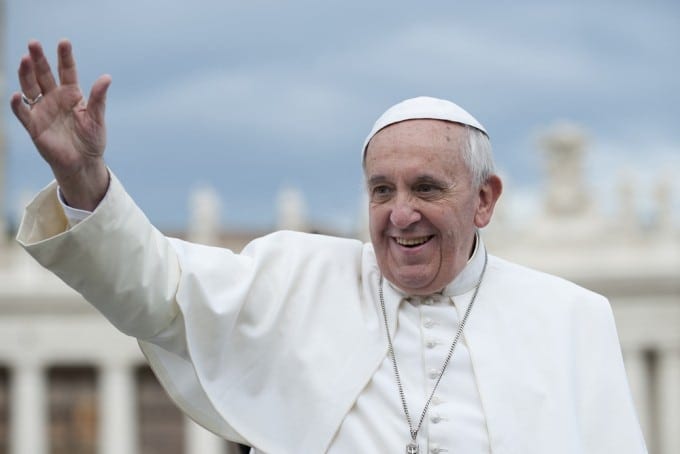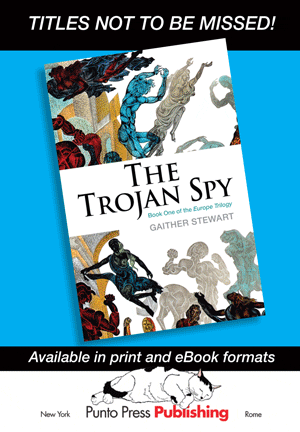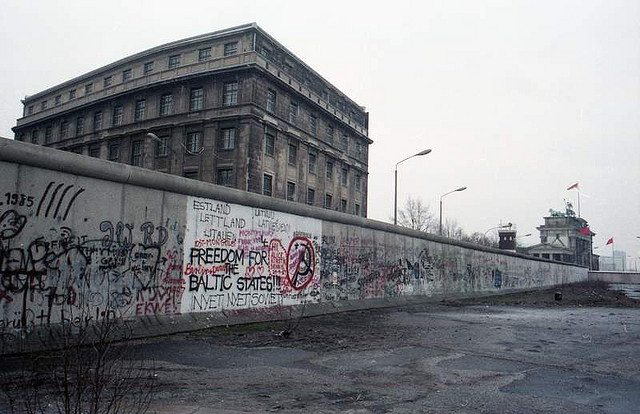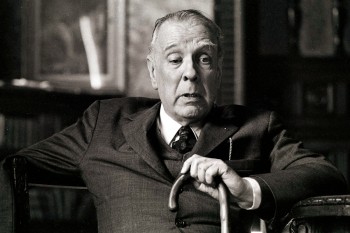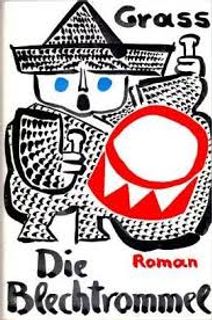A Radical Vatican?
NAOMI KLEIN •> The New Yorker
[dropcap]W[/dropcap]hen I was first asked to speak at a Vatican press conference on Pope Francis’s recently published climate-change encyclical, “Laudato Si’,” I was convinced that the invitation would soon be rescinded. Now the press conference and, after it, a two-day symposium to explore the encyclical is just two days away. This is actually happening.
As usual ahead of stressful trips, I displace all of my anxiety onto wardrobe. The forecast for Rome in the first week of July is punishingly hot, up to ninety-five degrees Fahrenheit. Women visiting the Vatican are supposed to dress modestly, no exposed legs or upper arms. Long, loose cottons are the obvious choice, the only problem being that I have a deep-seated sartorial aversion to anything with the whiff of hippie.
Surely the Vatican press room has air-conditioning. Then again, “Laudato Si’ ” makes a point of singling it out as one of many “harmful habits of consumption which, rather than decreasing, appear to be growing all the more.” Will the powers that be make a point of ditching the climate control just for this press conference? Or will they keep it on and embrace contradiction, as I am doing by supporting the Pope’s bold writings on how responding to the climate crisis requires deep changes to our growth-driven economic model—while disagreeing with him about a whole lot else?
To remind myself why this is worth all the trouble, I reread a few passages from the encyclical. In addition to laying out the reality of climate change, it spends considerable time exploring how the culture of late capitalism makes it uniquely difficult to address, or even focus upon, this civilizational challenge. “Nature is filled with words of love,” Francis writes, “but how can we listen to them amid constant noise, interminable and nerve-wracking distractions, or the cult of appearances?”
I glance shamefully around at the strewn contents of my closet. (Look: some of us don’t get to wear the same white getup everywhere…)
JULY 1ST—THE F-WORD
“The Bible has no place for a tyrannical anthropocentrism unconcerned for other creatures.”
[dropcap]F[/dropcap]our of us are scheduled to speak at the Vatican press conference, including one of the chairs of the United Nations’ Intergovernmental Panel on Climate Change. All except me are Catholic. In his introduction, Father Federico Lombardi, the director of the Holy See press office, describes me as a “secular Jewish feminist”—a term I used in my prepared remarks but never expected him to repeat. Everything else Father Lombardi says is in Italian, but these three words are spoken slowly and in English, as if to emphasize their foreignness.

The first question directed my way is from Rosie Scammell, with the Religion News Service: “I was wondering how you would respond to Catholics who are concerned by your involvement here, and other people who don’t agree with certain Catholic teachings?”
This is a reference to the fact that some traditionalists have been griping about all the heathens, including United Nations Secretary-General Ban Ki-moon and a roster of climate scientists, who were spotted inside these ancient walls in the run-up to the encyclical’s publication. The fear is that discussion of planetary overburden will lead to a weakening of the Church’s position on birth control and abortion. As the editor of a popular Italian Catholic Web site put it recently, “The road the church is heading down is precisely this: To quietly approve population control while talking about something else.”
I respond that I am not here to broker a merger between the secular climate movement and the Vatican. However, if Pope Francis is correct that responding to climate change requires fundamental changes to our economic model—and I think he is correct—then it will take an extraordinarily broad-based movement to demand those changes, one capable of navigating political disagreements.
After the press conference, a journalist from the U.S. tells me that she has “been covering the Vatican for twenty years, and I never thought I would hear the word ‘feminist’ from that stage.”
The air-conditioning, for the record, was left on.
The British and Dutch ambassadors to the Holy See host a dinner for the conference’s organizers and speakers. Over wine and grilled salmon, discussion turns to the political ramifications of the Pope’s trip to the United States this September. One of the guests most preoccupied with this subject is from an influential American Catholic organization. “The Holy Father isn’t making it easy for us by going to Cuba first,” he says.
I ask him how spreading the message of “Laudato Si’ ” is going back home. “The timing was bad,” he says. “It came out around the same time as the Supreme Court ruling on gay marriage, and that kind of sucked all the oxygen out of the room.” That’s certainly true. Many U.S. bishops welcomed the encyclical—but not with anything like the Catholic firepower expended to denounce the Supreme Court decision a week later.
…
The contrast is a vivid reminder of just how far Pope Francis has to go in realizing his vision of a Church that spends less time condemning people over abortion, contraception, and who they marry, and more time fighting for the trampled victims of a highly unequal and unjust economic system. When climate justice had to fight for airtime [in the US] with denunciations of gay marriage, it didn’t stand a chance.
On the way back to the hotel, looking up at the illuminated columns and dome of St. Peter’s Basilica, it strikes me that this battle of wills may be the real reason such eclectic outsiders are being invited inside this cloistered world. We’re here because many powerful Church insiders simply cannot be counted upon to champion Francis’s transformative climate message—and some would clearly be happy to see it buried alongside the many other secrets entombed in this walled enclave.
Before bed, I spend a little more time with “Laudato Si’ ” and something jumps out at me. In the opening paragraph, Pope Francis writes that “our common home is like a sister with whom we share our life and a beautiful mother who opens her arms to embrace us.” He quotes Saint Francis of Assisi’s “Canticle of the Creatures,” which states, “Praise be to you, my Lord, through our Sister, Mother Earth, who sustains and governs us, and who produces various fruit with colored flowers and herbs.”
Several paragraphs down, the encyclical notes that Saint Francis had “communed with all creation, even preaching to the flowers, inviting them ‘to praise the Lord, just as if they were endowed with reason.’ ” According to Saint Bonaventure, the encyclical says, the thirteenth-century friar “would call creatures, no matter how small, by the name of ‘brother’ or ‘sister.’ ”
Later in the text, pointing to various biblical directives to care for animals that provide food and labor, Pope Francis comes to the conclusion that “the Bible has no place for a tyrannical anthropocentrism unconcerned for other creatures.”
[dropcap]C[/dropcap]hallenging anthropocentrism is ho-hum stuff for ecologists, but it’s something else for the pinnacle of the Catholic Church. You don’t get much more human-centered than the persistent Judeo-Christian interpretation that God created the entire world specifically to serve Adam’s every need. As for the idea that we are part of a family with all other living beings, with the earth as our life-giving mother, that too is familiar to eco-ears. But from the Church? Replacing a maternal Earth with a Father God, and draining the natural world of its sacred power, were what stamping out paganism and animism were all about.
By asserting that nature has a value in and of itself, Francis is overturning centuries of theological interpretation that regarded the natural world with outright hostility—as a misery to be transcended and an “allurement” to be resisted. Of course, there have been parts of Christianity that stressed that nature was something valuable to steward and protect—some even celebrated it—but mostly as a set of resources to sustain humans.
Francis is not the first Pope to express deep environmental concern—John Paul II and Benedict XVI did as well. But those Popes didn’t tend to call the earth our “sister, mother” or assert that chipmunks and trout are our siblings.
JULY 2ND—BACK FROM THE WILDERNESS
In St. Peter’s Square, the souvenir shops are selling Pope Francis mugs, calendars, aprons—and stacks and stacks of bound copies of “Laudato Si’,” available in multiple languages. Window banners advertise its presence. At a glance, it looks like just another piece of papal schlock, not a document that could transform Church doctrine.
This morning is the opening of “People and Planet First: The Imperative to Change Course,” a two-day gathering to shape an action plan around “Laudato Si,’” organized by the International Alliance of Catholic Development Organisations and the Pontifical Council for Justice and Peace. Speakers include Mary Robinson, the former President of Ireland and a current United Nations Special Envoy on Climate Change, as well as Enele Sopoaga, the Prime Minister of Tuvalu, an island nation whose existence is under threat from rising seas.
A soft-spoken bishop from Bangladesh leads an opening prayer, and Cardinal Peter Kodwo Appiah Turkson—a major force behind the encyclical—delivers the first keynote. At sixty-six, Turkson’s temples are gray, but his round cheeks are still youthful. Many speculate that this could be the man to succeed the seventy-eight-year-old Francis, becoming the first African pope.
Most of Turkson’s talk is devoted to citing earlier Papal encyclicals as precedents for “Laudato Si’.” His message is clear: this is not about one Pope; it’s part of a Catholic tradition of seeing the earth as a sacrament and recognizing a “covenant” (not a mere connection) between human beings and nature.
At the same time, the Cardinal points out that “the word ‘stewardship’ only appears twice” in the encyclical. The word “care,” on the other hand, appears dozens of times. This is no accident, we are told. While stewardship speaks to a relationship based on duty, “when one cares for something it is something one does with passion and love.”
This passion for the natural world is part of what has come to be called “the Francis factor,” and clearly flows from a shift in geographic power within the Catholic Church. Francis is from Argentina, and Turkson from Ghana. One of the most vivid passages in the encyclical—“Who turned the wonderworld of the seas into underwater cemeteries bereft of color and life?”—is a quotation from a statement of the Catholic Bishops’ Conference of the Philippines.
This reflects the reality that, in large parts of the global south, the more anti-nature elements of Christian doctrine never entirely took hold. Particularly in Latin America, with its large indigenous populations, Catholicism wasn’t able to fully displace cosmologies that centered on a living and sacred Earth, and the result was often a Church that fused Christian and indigenous world views. With “Laudato Si’,” that fusion has finally reached the highest echelons of the Church.
Yet Turkson seems to gently warn the crowd here not to get carried away. Some African cultures “deified” nature, he says, but that is not the same as “care.” The earth may be a mother, but God is still the boss. Animals may be our relatives, but humans are not animals. (sic) Still, once an official Papal teaching challenges something as central as human dominion over the earth, is it really possible to control what will happen next?
This point is made forcefully by the Irish Catholic priest and theologian Seán McDonagh, who was part of the drafting process for the encyclical. His voice booming from the audience, he urges us not to hide from the fact that the love of nature embedded in the encyclical represents a profound and radical shift from traditional Catholicism. “We are moving to a new theology,” he declares.
To prove it, he translates a Latin prayer that was once commonly recited after communion during the season of advent. “Teach us to despise the things of the earth and to love the things of heaven.” Overcoming centuries of loathing the corporeal world is no small task, and, McDonagh argues, it serves little purpose to downplay the work ahead.
It’s thrilling to witness such radical theological challenges being batted around inside the curved wooden walls of an auditorium named after St. Augustine, the theologian whose skepticism of things bodily and material so profoundly shaped the Church. But I would imagine that for the conspicuously silent men in black robes in the front row, who study and teach in this building, it is also a little terrifying.
This evening’s dinner is much more informal: a sidewalk trattoria with a handful of Franciscans from Brazil and the U.S., as well as McDonagh, who is treated by the others as an honorary member of the order.
My dinner companions have been some of biggest troublemakers within the Church for years, the ones taking Christ’s proto-socialist teachings seriously. Patrick Carolan, the Washington, D.C.-based executive director of the Franciscan Action Network, is one of them. Smiling broadly, he tells me that, at the end of his life, Vladimir Lenin supposedly said that what the Russian Revolution had really needed was not more Bolsheviks but ten St. Francises of Assisi.
Now, all of a sudden, these outsiders share many of their views with the most powerful Catholic in the world, the leader of a flock of 1.2 billion people. Not only did this Pope surprise everyone by calling himself Francis, as no Pope ever had before him, but he appears to be determined to revive the most radical Franciscan teachings. Moema de Miranda, a powerful Brazilian social leader, who was wearing a wooden Franciscan cross, says that it feels “as if we are finally being heard.”
For McDonagh, the changes at the Vatican are even more striking. “The last time I had a Papal audience was 1963,” he tells me over spaghetti vongole. “I let three Popes go by.” And yet here he is, back in Rome, having helped draft the most talked-about encyclical anyone can remember.

Fr Seán McDonagh: “There is a need for celebration as well as for mourning rituals that acknowledge the huge problems of global warming and the extinction of species…We have no way ritually of dealing with that. We should have a mourning ritual that tackles seriously the loss.”
McDonagh points out that it’s not just Latin Americans who figured out how to reconcile a Christian God with a mystical Earth. The Irish Celtic tradition also managed to maintain a sense of “divine in the natural world. Water sources had a divinity about them. Trees had a divinity to them.” But, in much of the rest of the Catholic world, all of this was wiped out. “We are presenting things as if there is continuity, but there wasn’t continuity. That theology was functionally lost.” (It’s a sleight of hand that many conservatives are noticing. “Pope Francis, The Earth Is Not My Sister,” reads a recent headline in The Federalist, a right-wing Web magazine.)
As for McDonagh, he is thrilled with the encyclical, although he wishes it had gone even further in challenging the idea that the earth was created as a gift to humans. How could that be so, when we know it was here billions of years before we arrived?
I ask how the Bible could survive this many fundamental challenges—doesn’t it all fall apart at some point? He shrugs, telling me that scripture is ever evolving, and should be interpreted in historical context. If Genesis needs a prequel, that’s not such a big deal. Indeed, I get the distinct sense that he’d be happy to be part of the drafting committee.
JULY 3RD—CHURCH, EVANGELIZE THYSELF
[dropcap]I [/dropcap]wake up thinking about stamina. Why did Franciscans like Patrick Carolan and Moema de Miranda stick it out for so long in an institution that didn’t reflect many of their deepest beliefs and values—only to live to see a sudden shift that many here can only explain with allusions to the supernatural? Carolan shared with me that he had been abused by a priest at age twelve. He is enraged by the cover-ups, and yet he did not let it drive him permanently from his faith. What kept them there?
I put this to Miranda when I see her at the end of Mary Robinson’s lecture. (Robinson had gently criticized the encyclical for failing to adequately emphasize the role of women and girls in human development.)
Miranda corrects me, saying that she is not actually one of those who stuck it out for much of their lifetimes. “I was an atheist for years and years, a Communist, a Maoist. Until I was thirty-three. And then I was converted.” She described it as a moment of pure realization: “Wow, God exists. And everything changed.”
I asked her what precipitated this, and she hesitates, and laughs a little. She tells me she had been going through a very difficult period in her life, when she came across a group of women “who had something different, even in their suffering. And they started talking about the presence of God in their lives in such a way that made me listen. And then it was, suddenly, God just is there. In one moment, it was something impossible for me to think. In the other moment, it was there.”
Conversion—I had forgotten about that. And yet it may be the key to understanding the power and potential of “Laudato Si’.” Pope Francis devotes an entire chapter of the encyclical to the need for an “ecological conversion” among Christians, “whereby the effects of their encounter with Jesus Christ become evident in their relationship with the world around them. Living our vocation to be protectors of God’s handiwork is essential to a life of virtue; it is not an optional or a secondary aspect of our Christian experience.”
…
An evangelism of ecology, I realize, is what I have been witnessing take shape during the past three days in Rome—in the talk of “spreading the good news of the encyclical,” of “taking the Church on the road,” of a “people’s pilgrimage” for the planet, in Miranda laying out plans to spread the encyclical in Brazil through radio ads, online videos, and pamphlets for use in parish study groups.
A millennia-old engine designed to proselytize and convert non-Christians is now preparing to direct its missionary zeal inward, challenging and changing foundational beliefs about humanity’s place in the world among the already faithful. In the closing session, Father McDonagh proposes “a three-year synod on the encyclical,” to educate Church members about this new theology of interconnection and “integral ecology.”
Many have puzzled over how “Laudato Si’ ” can simultaneously be so sweepingly critical of the present and yet so hopeful about the future. The Church’s faith in the power of ideas—and its fearsome capacity to spread information globally—goes a long way toward explaining this tension. People of faith, particularly missionary faiths, believe deeply in something that a lot of secular people aren’t so sure about: that all human beings are capable of profound change. They remain convinced that the right combination of argument, emotion and experience can lead to life-altering transformations. That, after all, is the essence of conversion.
The most powerful example of this capacity for change may well be Pope Francis’s Vatican. And it is a model not for the Church alone. Because if one of the oldest and most tradition-bound institutions in the world can change its teachings and practices as radically, and as rapidly, as Francis is attempting, then surely all kinds of newer and more elastic institutions can change as well.
And if that happens—if transformation is as contagious as it seems to be here—well, we might just stand a chance of tackling climate change.
ABOUT THE AUTHOR
[box type=”bio”] Naomi Klein is the author of “This Changes Everything: Capitalism vs. the Climate,” which comes out in paperback this August. A documentary based on the book, directed by Avi Lewis, will be released in September.[/box]
![]()
FACT TO REMEMBER:
IF THE WESTERN MEDIA HAD ITS PRIORITIES IN ORDER AND ACTUALLY INFORMED, EDUCATED AND UPLIFTED THE MASSES INSTEAD OF SHILLING FOR A GLOBAL EMPIRE OF ENDLESS WARS, OUTRAGEOUS ECONOMIC INEQUALITY, AND DEEPENING DEVASTATION OF NATURE AND THE ANIMAL WORLD, HORRORS LIKE THESE WOULD HAVE BEEN ELIMINATED MANY YEARS, PERHAPS DECADES AGO. EVERY SINGLE DAY SOCIAL BACKWARDNESS COLLECTS ITS OWN INNUMERABLE VICTIMS.
![]()
[printfriendly]
REBLOGGERS NEEDED. APPLY HERE!
Get back at the lying, criminal mainstream media and its masters by reposting the truth about world events. If you like what you read on The Greanville Post help us extend its circulation by reposting this or any other article on a Facebook page or group page you belong to. Send a mail to Margo Stiles, letting her know what pages or sites you intend to cover. We MUST rely on each other to get the word out!
And remember: All captions and pullquotes are furnished by the editors, NOT the author(s).
What is $5 a month to support one of the greatest publications on the Left?
